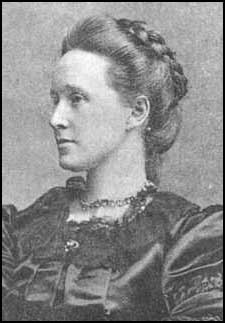| Profile | Major Works | Resources |
Millicent Garrett Fawcett,, 1847-1929.

English political reformer, economist, and wife of Cambridge professor Henry Fawcett.
Millicent Garrett came from a relatively wealthy background, and was the younger sister of Elizabeth Garrett (Britain's first licensed female doctor). While still in her teens, Millicent became interested in radical liberal politics, after hearing lectures by John Stuart Mill. She became an enthusiast of Mill, and it was Mill who introduced her to Henry Fawcett, then an M.P and professor of economics at Cambridge. Despite their age difference, it was an intellectual match, and Henry and Millicent were married in 1867.
Millicent Garrett Fawcett continued to be actively involved in politics and Women's Suffrage movement (she was elected as president of the not-so-militant National Union of Women's Suffrage Societies in 1890, a post which she kept until 1914). Reasonably well-educated for the time, Millicent Fawcett also served the crucial role of secretary for her blind husband.
Her most famous work is her 1870 Political Economy for Beginners, a brief but wildly successful book. It set a contemporary record as a principles textbook for students: it ran through ten editions in 41 years. The success of her book was even more extraordinary given that it presented economic theory in a thoroughly Ricardian vein, then waning in Great Britain in the wake of the Marginalist Revolution. Even more strikingly, Millicent Fawcett kept the classical wages-fund doctrine in the late editions of the text, despite being aware of its problems. She went on to write a handful of more items on economic topics, culminating in a notable collection with Henry Fawcett (1872).
A vigorous promoter of education for women, she helped set up Newnham College for women at Cambridge in 1871. Her daughter, Philippa Fawcett, became the first woman to top the Mathematical Tripos at Cambridge in 1890, albeit she was not formally granted the title of 'Senior Wrangler'.
After Henry Fawcett's early death, Millicent became more involved in political activities (e.g. she was appointed during the Boer War in 1901 to inquire into conditions in British concentration camps) and spent less time writing on economic subjects. She was knighted ("damed") in 1925.
|
HET
|
|
Resources on the Fawcetts
|
All rights reserved, Gonšalo L. Fonseca
